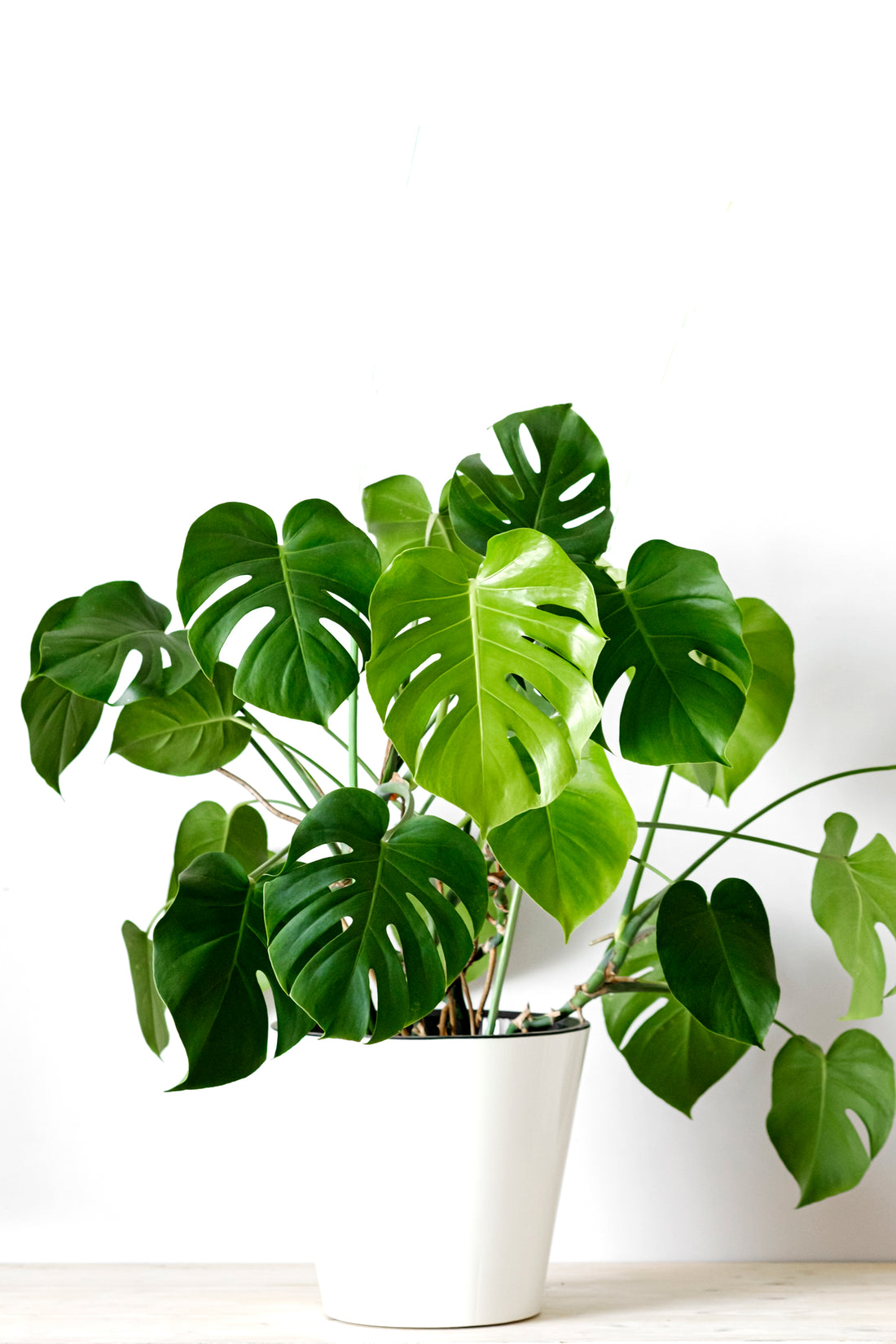
5 Expert Tips for Caring for Your Monstera Deliciosa or Swiss Cheese Plant
Share
If you're lucky enough to have a Monstera plant in your home, you know how beautiful and striking they can be. With their large, glossy leaves and unique perforations, Monstera plants are a true statement piece in any space. But as with any plant, they do require some care and attention to thrive. Here are some tips and tricks for keeping your Monstera plant healthy and happy.
Light
Finding the right lighting conditions for your Monstera Deliciosa plant is essential for its health and growth. These tropical plants are native to rainforests, where they grow in the filtered light that reaches the forest floor. In your home, you can recreate this environment by providing your Monstera Deliciosa with bright, indirect light. Though they can tolerate a wide range of light conditions.
Avoid placing them in direct sun, as this can scorch the leaves. Instead, try to find a spot near a window where the plant will receive indirect sunlight throughout the day. If you have a plant that's not getting enough light, you may notice the leaves yellowing or the plant becoming leggy. You’ll want to also avoid direct sunlight. Monstera Deliciosa plants do not tolerate direct sunlight well, as it can scorch their leaves and cause yellowing or browning. Instead, aim for bright, indirect light that filters through a sheer curtain or window screen.
South- or West-facing windows tend to be the best match for Monsteras. They usually provide the most natural light and are ideal for Monstera Deliciosa plants. If you have a South- or West-facing window, place your plant a few feet away from the window to allow for some indirect light.
If you don't have a suitable window for your Monstera Deliciosa, or if you live in a location with limited natural light, don't worry. You can still use artificial light to help your plant grow. Look for grow lights or fluorescent light fixtures that provide bright, indirect light.
To be sure your Monstera is absorbing all of the light possible, it’s smart to wipe the leaves with a cleaner/conditioner/shine and a lint-free cloth to remove dirt, debris, and calcium spots regularly. Be sure the shine you use is non-clogging to avoid issues with the plant’s respiration process. We recommend Leaf Radiance.
Watering
Monstera plants are prone to root rot, so it's important to be careful not to over-water them. Allow the top inch or so of soil to dry out before watering, and be sure to empty any excess water from the tray or saucer. To test the moisture level of the soil, simply stick your finger about an inch into the soil. If it's dry, it's time to water. If it's still moist, wait a few more days before watering again. If you’re worried that your plant may be over or under-watered, using Urban Gardener’s Super Growth Elixir two to three times per week can help your Monstera deal with water retention and stress response.
When you do water your Monstera Deliciosa, be sure to water it deeply. This means the water should soak at least eight inches into the soil allowing the water to reach the entire root system. This will help the plant absorb water more effectively and encourage deep, healthy root growth.
Consider also that this plant is sensitive to temperature changes, so it's important to use room-temperature water when watering. Cold water can shock the roots and cause damage, while hot water can evaporate too quickly and not provide the plant with enough moisture.

Fertilizing
Monstera plants benefit from regular fertilizing, especially during the growing season (spring and summer). Use a balanced, water-soluble fertilizer and dilute it to half the recommended strength. In addition to monthly fertilizing, Monstera plants will respond well to supplemental nutrients like those found in Super Growth Elixir. This product contains nourishing powerhouses like Norwegian Sea Kelp, Vitamin C, and Green Tea Extract.
Repotting
Monstera plants have a reputation for being fast growers, so you may need to repot your plant every year or so. When repotting, be sure to use a well-draining potting mix and choose a pot that's only slightly larger than the current one. You can also propagate your Monstera plant by cutting off a stem with a few leaves and rooting it in water or soil.
Pests
Monstera plants are generally resistant to pests, but they can occasionally be affected by spider mites, mealybugs, or scale. If you notice any of these pests on your plant, using a natural, plant-based pest control product like Urban Gardener’s Say No To Bugs can be a great way to eliminate any bugs on the leaves, stems, soil, and surrounding areas. In addition, Say No To Bugs will continue to deter any insects from making their homes in your plants using the power of essential oils like Cedar and Rosemary with semi-regular application.
No holes in your Swiss Cheese (Plant)?
The unique holes or "fenestration" on a Monstera plant's leaves are a sign of a healthy plant, but if your plant is lacking these features, it could be a sign that it is not in the ideal environment. To help your plant develop these holes, take a look at the amount of light and water it is receiving and make any necessary adjustments. You can also try pushing the plant's aerial roots down into the soil to help it absorb more nutrients. Keep in mind that these holes only appear on more mature leaves, so you may need to be patient as your plant grows.
By following these tips, you can help your Monstera plant thrive and become a beautiful addition to your home. With a little care and attention, you'll be rewarded with healthy, glossy leaves and a plant that will surely be the envy of all your plant-loving friends.


